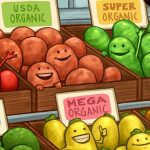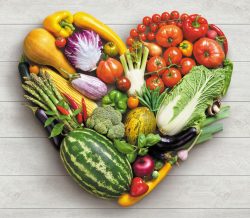It’s Easy to Understand Organic Foods! {Summer 2020}

Organic Foods
Understanding Organic Foods is Easy!
Many believe that it is hard to understand organic foods. Simply put, organic foods are produced using animal and environmentally friendly farming techniques. Its farming processes avoid the use of man-made farming techniques for product output. Pesticides, fertilizers, growth regulators, and livestock feed additives are not used in producing organic foods.
So, You’ve Decided to Go Organic. Congratulations! Now What?
Over the past several years, grocery stores have significantly increased the number of organic products that they sell. You can now find organic items such as produce, meats, and packaged snack foods. To ensure quality, the products that are labeled as “organic” must meet certain regulations and standards set by the U.S. Department of Agriculture (USDA).
Organic means that the animals and crops were grown without the use of pesticides or other questionable chemicals. When organic, they do not contain synthetic substances, nor have they been genetically engineered. The animals must also be raised under guidelines that ensure they are treated humanely and that their diet is organic as well; they should not be given any antibiotics or growth hormones.
The following are terms you should be familiar with when it comes to organic labeling:
- 100% Organic: These products contain only organic ingredients. They may display the “USDA Organic” seal.
- Organic: These products contain at least 95% organic ingredients. They may also display the “USDA Organic” seal.
- Made with Organic Ingredients: These products contain 70%-95% organic ingredients. They cannot display the “USDA Organic” seal.
- Products containing less than 70% organic ingredients can only use the term “organic” to describe the organic ingredients within the ingredients list. They cannot display the “USDA Organic” seal.
- “Natural” does not mean organic. The term “natural” is not regulated by the USDA. It may appear on food labels without meeting organic standards.
Is Organic Food More Nutritious?
Do not misunderstand the term organic to mean that anything you eat that is organic is good for you. Sure, you can have cookies made from all organic ingredients but that does not mean they are healthy or the best food choice. They still contain empty calories. The term organic simply means that the food was grown or raised according to certain standards.
The quality of the food or its nutritional value can still be compromised. However, who wouldn’t agree that eating foods without pesticides and other harmful ingredients is a far better and healthier choice than its alternative? Another benefit of organic food is that the vitamin and mineral content is higher than in processed foods.
Some may argue that because organic foods are not protected from diseases or insects because they have not been treated with pesticides, that they not safe. The amount of damage that pesticides can do to your body is incredible. The chemicals you consume can have long-lasting ill effects on your body that may be irreversible over time.
Can’t Afford Organic?
When your budget is limited and you can’t buy organic, choose fruits and vegetables that are less likely to have pesticide residue. Produce most likely to be contaminated includes apples, bell peppers, celery, cherries, grapes, lettuce, nectarines, peaches, pears, potatoes spinach, and strawberries. It is best to buy the organic varieties of these items.
Fortunately, you can drastically reduce your exposure to bacteria and pesticides found on produce by washing them in water and white vinegar. This is a safe solution that kills approximately 98% of all bacteria and it also removes pesticides.
Tips for Making Non-Organic Foods Safer
To create a fruit and vegetable wash, mix three parts of water with one part of white vinegar in a spray bottle. Spray the solution on your fruits and vegetables to remove bacteria and residue. Be sure to rinse the food with water after spraying to complete the process.
If you have more time and want to clean fruits and veggies while you are doing something else, simply fill a bowl with water and add 1/8 to 1/2 of a cup of vinegar (depending on the size of your bowl). Soak the food for 15 to 20 minutes then rinse with water.
Be happy, be healthy, Be OrganicallYou!


